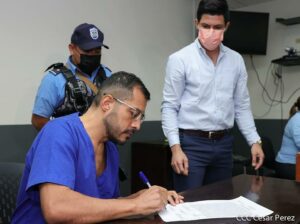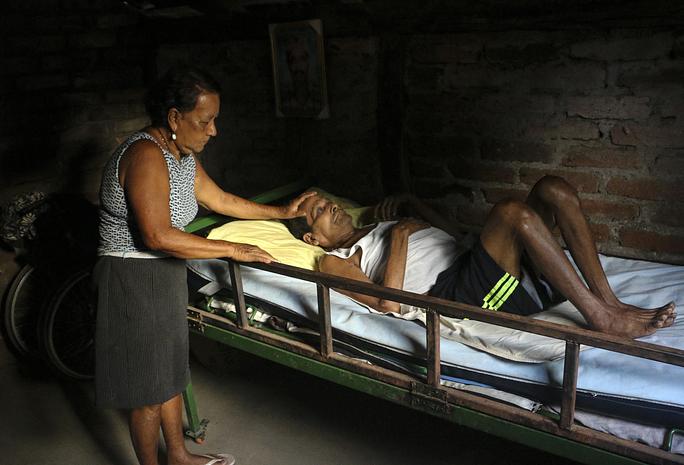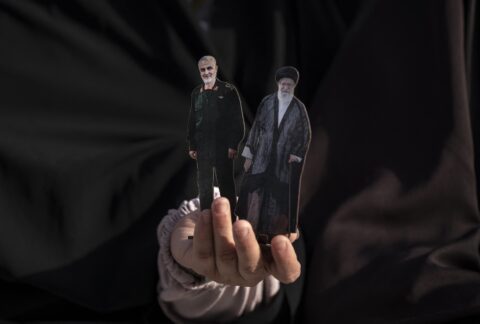The Daniel Ortega-Rosario Murillo regime has established a terrorist state in Nicaragua, where impunity is official policy. Such were some of the conclusions of a new report from Costa Rica-based nongovernmental organization Human Rights Collective Nicaragua Nunca Más and Nicaraguan Urnas Abiertas Citizen Observatory. The investigations highlight the destruction of the rule of law, leaving citizens defenseless, and reducing institutions to obedient bodies without autonomy.
“The armed forces defend a revolution that does not exist in a democracy that does not exist. In the name of those things that do not exist and in the name of peace, they’ve imposed terror since 2018,” Gonzalo Carrión, a human rights advocate with the Nunca Más Collective, told Diálogo on July 15. “They do it with an apparatus that includes the National Assembly, which produces completely arbitrary laws to try to legalize persecution.”
“There’s a massive displacement due to this terror producing apparatus, a real exodus that damages thousands and thousands of families. In other cases, there are arrests; and when they carry out those arrests, they raid houses simultaneously at any hour, and that instills terror,” Carrión added.
Urnas Abiertas counts new forms of violence and terror such as migratory repression; denied access to documents; tax extortion; government retribution against large, medium, and small businesses; retribution against social benefits and public services; persecution of the cultural sector and the Catholic Church; elimination of university autonomy; control over Sandinista militants and public officials; and forced migration.

Police are the main agents of repression with harassment, arbitrary detentions, raids, confiscations, and other types of aggressions, Urnas Abiertas said. “However, other unarmed agents were identified, mostly institutional, such as the penitentiary system and the justice system, the National Assembly, the Directorate of Migration and Alien Affairs, and city councils, among others.”
“Harassment and attacks are the main forms of political violence […] directed against relatives of political prisoners, those released from prison, and citizens perceived as opponents,” Ivania Álvarez, Urnas Abiertas citizen networks coordinator, told Nicaraguan TV news show La Mesa Redonda. “Also [directed] against those who have done some kind of digital activism and family members who lost their children to state violence in 2018. This type of repression is maintained where perpetrators are the Police and paramilitaries.
Roberto Samcam, military analyst and author of the book Ortega, the Bane of Nicaragua (Ortega, El Calvario de Nicaragua), corroborates the terrorist practices of the Army, Police, paramilitaries, and the ruling Sandinista National Liberation Front party, and says that the regime even released 25,000 common prisoners to exercise social control over people.
“The parapolice supported the police between April and June 2018; having exceeded the possibilities of containing the protests. The majority were anti-social elements recruited in neighborhoods of Managua and other municipalities,”Samcam told Diálogo on July 12. “The paramilitaries were a force between 3,000 and 3,500 men with military experience. The main commanders were former high-ranking army officers who had been there during the war of the 1980s. They had a military structure and used military tactics, the weapons used had the characteristics of a conventional war and command and communications system of a military force.”
One of the most damaging effects of the terrorist state the Ortega-Murillo regime implemented is the lack of confidence in the justice system, because citizens have no one to turn to in order to protect their rights, Paulo Abrão, former executive secretary of the Inter-American Commission on Human Rights, said. “The criminalization of political dissent or the use of law for political persecution or narrowing civic space and the country’s own democracy, is a way the dictatorship found to remain in power and break off with the international community.”
Political prisoners
Political prisoners are another aspect of the terrorist state. The Nicaraguan human rights organization Mechanism for the Recognition of Political Prisoners(Mecanismo para el Reconocimiento de Personas Presas Políticas) said that there are 182 opposition members detained in Nicaragua. Of these, 46 were arrested in 2021 and seven were presidential candidates in the November 2021 elections, French state-owned international news network France 24 reported.
“How would you feel after more than 390 days forced to remain in darkness around the clock, where you cannot speak a single word, where you have sunlight only every 10 days for 15 minutes, where you are forced to undergo interrogations?” Bertha Valle, wife of Felix Maradiaga, former presidential candidate imprisoned since June 2021, told the press on July 7. “This state of confinement, of isolation from the world, […] is giving them the feeling that they are being shut down. There is an underlying intent […] that is causing them irreversible damage. There is no time to lose […], we must stop the torture.”









